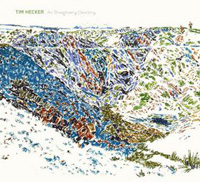
Tim Hecker
An Imaginary Country
(Kranky; 2009)
By Joel Elliott | 11 March 2009
When I first read our interview with Tim Hecker, I was slightly disappointed. There is a sense as a music critic that you want the artist to be able to help you extrapolate meaning from their work, and when Hecker admitted that you could “throw any reference in and after a while it sticks,” I felt like I’d been preemptively cut off from interpreting his work, however loosely I tend to assign meaning to music like this. But you can take the statement as a cynical dismissal of extra-musical references, or as a literal—and rather humble—confession of the emotional malleability of his music.
Personally, I will forever associate Hecker with a ride I took on the GO Train between Toronto and Chatham, around Ontario’s industrial belt, while listening to Radio Amor (2003) and reading Denis Johnson’s poetry collection The Throne of the Third Heaven of the Nations Millennium General Assembly, itself concerned with the redemption of barren, post-industrial landscapes. While the trip did sporadically include the province’s natural beauty, it was more representative of the wasteland that pops up on the edge of smaller cities, where nature chokes out abandoned warehouses and industrial complexes. While music that aspires to the status of untouched, natural beauty tends to have to push to transform the listener there, Hecker’s music seemed and seems to serve the function of passive but meditative acceptance of an order that is at once ugly and somehow natural (that industrial development which initially plagued nature would eventually be consumed by it). And while it doesn’t take much to complement beauty, it takes a lot for music that is itself beautiful to somehow come to terms with ugliness.
Nowhere is this idea of acceptance clearer than on An Imaginary Country. In a sense the album evokes nothing so much as Hecker himself, diligently and intuitively molding his sounds through synthesizer, guitar and laptop, and as a result may be the most symbiotic album of the year. The minute-long interlude “Utropics,” featuring a haunting, distant choir, is the sole representational moment on the album but enough to provide an emotional pivot point for the entire thing—which goes lengths towards detailing how patient Hecker is. By evoking its own creation, the album in turn represents the pure act of listening. This also seems to be an exercise in zen, insofar as it seems best appreciated by not really paying attention to it. Or giving it your total attention but not trying to pick apart its elements or think of anything. In that respect, it’s a good thing the album leaked early, since this is definitely something that needs to be lived with for awhile.
After a couple of records of heavy distortion, Mirages (2004) and Harmony in Ultraviolet (2006), An Imaginary Country might be one of the lightest albums Hecker’s recorded…again the sense of acceptance with its own turmoil. “Borderlands” may be his most breathtaking piece since “Music For Tundra,” technically dense in terms of the number of different sounds but somehow baring an immense sense of space. Far from evoking a specific place, “Borderlands” is all liminality. Like approaching an infinite horizon, it seems as if every new delayed wash of synths is constantly fading as soon as it enters. Sort of like Fennesz’s recent Black Sea (2008). Sorry, Tim.
But if the two artists have never sounded as similar as they do now, they’ve reached this place independently: Fennesz has always been interested in employing processed guitar towards more compositional ends, be it pop or classical, while Hecker has been more about capturing a certain sound or specific idea (both within individual tracks and across albums). As a result, Hecker often attains a greater emotional resonance, even if it’s harder to differentiate between tracks. It’s worth mentioning something else brought up in the interview, about Hecker’s suburban upbringing fostering an interest in less overtly experimental music. While his music is far from seeming “amateur” in any sense of the word, it follows a reckless kind of intuition, one that accepts (or rejects, depending on how you look at it) any influence and absorbs it like a black hole.
There is definitely an aspect of An Imaginary Country that feels both briefer and more precarious than previous outings, which isn’t an affront, even if I first registered a comparison to Dead Cities, Red Seas & Lost Ghosts (2003) in “Sea of Pulses.” But even here its individual elements disperse as much as they come together: the even-paced bass seems to move either faster or slower than the washes of synths over it, depending on where you hear the accent. And of course there’s the obvious difference that Hecker rarely builds his tracks into anything, “Paragon Point” only swelling enough to keep it interesting and maintain the general mood.
Structurally, An Imaginary Country seems to mirror itself. “200 Years Ago” reprises the motif of the opening “100 Years Ago”—the most overt “melody” on the album—while the preceding “Where Shadows Make Shadows” uses the same bass pulses of “Sea of Pulses.” This time around, the pulses are more subsumed within a darker, fuller arrangement—complete with what sounds like a reprise of the choir but may just be my imagination—so the rhythm is harder to pick out. It’s as if, rather than employing the often used metaphor of excavation for found sound/ambient music, Hecker is instead burying, moving backwards in time. He isn’t really finding anything. He’s imagining it all, and the beautifully ugly dream scape is pulling him (and us) ever deeper, a train ride into a land taking its vengeance on the intrusion of anything artificial. Listen to hills roll over warehouses, brambles pull apart the tracks below, and branches scratch out a sky glassed by distant city lights.





